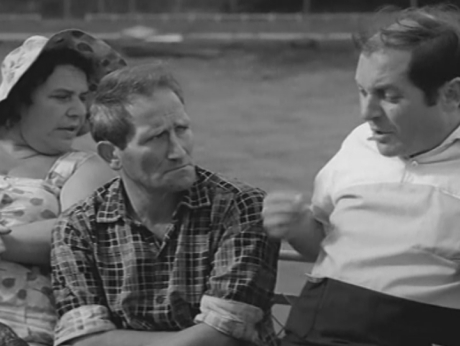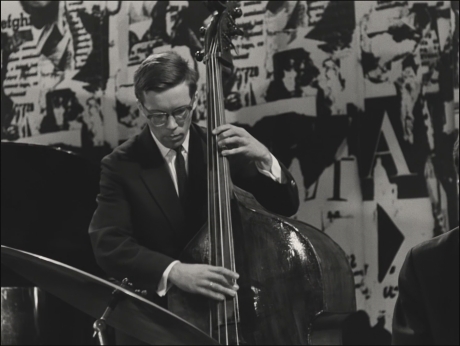
 overview
overview
Professor Wittembach, a pastor and German scientist, travels to Lithuania and Żmudź in order to do research on the remains of the old sacral literary activity. He stays at Count Michał Szemiot’s place , because he has a rich library of old prints. During his stay he notices his host’s strange behaviour and numerous odd situations. Everything starts to make sense when he learns the family story of the disordered Countess, the Count’s mother, being abducted by a bear. When Julia Dowgiałło, in whom Count Szemiot is in love with, visits, a series of tragic events occurs…

 storyline
storyline
Professor Wittembach, a pastor and German scientist, travels by train from Królewiec to Lithuania and Żmudź in order to do research on the remains of the old sacral literary activity. He meets Princess Pacowa from Vilnius and Julia Dowgiałło along with her governess on the train. The pastor tells them what the goal of his journey is and the Princess advises him to stay at Count Michał Szemiot’s place, because he has a rich library of old prints inherited from his father. On the way from the station, where the pastor was picked up by the Count’s coach driver, many strange things happen: first Wittembach hears a story about a devil who appears in the form of a pike without a tale on St.John’s night. Later a terrible storm breaks out and scares the horses: a wheel falls off the wagon. Wittembach hides from the rain in a nearby chapel while the wagon driver rides horseback to the closest town to see a blacksmith. Wittembach sees paintings of devils and tombs with human skeletons in the chapel – he becomes increasingly frightened. He goes out of the chapel and a nomad beggar, who also wants to hide from the rain, takes him for the devil. Finally Wittembach reaches Count Szemiot’s palace. Szemiot’s mother’s doctor greets him. They have dinner together and it is interrupted, because the doctor is called in to the sick Countess. She has psychological problems which are difficult to diagnose. The doctor calls them “a loss of mind”. Thirty years earlier the Countess had gone hunting and was caught by a bear who had imprisoned her for some time. When she had finally been rescued, she was scratched and naked, which made people think…After this event she never returned to full health, although people believed that giving birth nine months later would help her. The countess gave birth to a healthy boy, however she became even more lost afterwards and saw similarity in her child to the bear who had captured her. Wittembach is upset when he hears this story and has sympathy for the Countess. He then meets Count Szemiot, who has taken over some psychological problems from his mother: he seems to be absent at times, his thoughts go in strange directions, sometimes his behaviour causes fear or embarrassment. Szemiot takes Wittembach to his library. The professor finds a catechism by priest Ławicki that he didn’t think existed. He is very excited about his findings and begins his research. However he also makes sure to have a social life. He plays cards with the Count and the doctor, visits the palace, takes Szemiot for a hunting trip. During the trip they encounter more strange situations: they see a herd of bison, which is extremely rare, and they meet a witch who tells the Count that his nails are similar to a bear and that he will never be happy in love. Then she drifts away on a tile on the pond. Szemiot is in love with Julia Dowgiałło, who the professor met in the train and who is now on her way to the Count’s palace. In the evening Julia does a dance for everyone and shows her interest in Szemiot. However when he tries to kiss her, she runs away screaming that the Count squeezed her like a bear. Wittembach begins to wonder about all of these qualities of a bear that the Count has. However he is far from believing such superstitions. Soon Szemiot proposes to Julia and the pastor gives them a wedding. However on the night after the wedding a tragedy happens. Julia is murdered and the Count disappears. The only leads are the trails of bear teeth on the girl’s body and bear paws on the snow. The doctor makes everyone believe that the Count has turned into a bear. Wittembach goes away without finding out the truth. The doctor goes with him and admits that he had been driving the Count into a greater madness to have some entertainment in the palace. The Professor is disgusted and calls the doctor a villain. When he gets into the train he sees the bodies of rabbits, foxes and deer that the hunters had killed on the snow. Among them he sees the body of a huge bear. He prays for him.

 comment
comment

 press review
press review
“It would be unfair to say that “Lokis” was an unsuccessful film. It has many assets which cannot be ignored. It is made in a cultural way, the actors are good, the pictures done with taste by Stefan Matyjaszkiewicz. It has a clear atmosphere, effective scenography and bright dialogues. However, the viewer remains indifferent despite the strange issues and pathological intensity of emotions. Then why is there a feeling of cold distance, a feeling that the story being told is unimportant? (…) »Lokis« brings this kind of awkwardness that we feel when watching a fairy tale told in an unserious matter.
The lack of tradition for this type of film in our cinema is probably part of the explanation. When you watch »Lokis« you can often see how the necessity of leaving behind logical motivations and operating with effects of undefined dread (a storm, the hooting of an owl, etc) constrains the director’s freedom, intimidates him, makes him too discrete at times, or at other times he tries to rationalise too much or put accents on the parenthesis of romantic picturesqueness (a witch in the hollow of a tree). Majewski could not make up his mind as to the full stylization. He wanted to rescue the historical reality and the psychological similarity, but isn’t the result different: that he makes it harder for the viewer to agree to this type of literary fiction”?
Jan Józef Szczepański, Lokis, „Tygodnik Powszechny”, 1970, nr 41
"Here nothing is what it seems at first. The abduction of the Countess by the bear is only seen on pictures (beautifully stylized by Franciszek Starowieyski) in a briefcase hidden in the library of the palace. The detailed realism in the description of the court life has its counterpoint in the constant presence of the picturesque background of the folk customs, magic and superstitions. It is for a reason that Majewski deeply studied Kolberg. Grown-up lady servants who gave cold baths to the Countess along with the doctor sing a magical song as if they were taking part in witchcraft. For a peasant with a beard, during a stormy night, the pastor looked like a devil and his body seemed to be as astonishing as the Count’s face seemed to be to the pastor when the Count had been hallucinating during the night between the branches of trees. An old woman, who looks like a witch, walks without effort through swamps that swallow everything – maybe she just knows a secret passage. Was it really bear claws that hurt Julia? Maybe the count himself started to believe that he is a bear (…)? You only need to change your point of view slightly to make the story look completely different. It is possible to see a realistic psychological drama or an amazing thriller in it. The choice is up to the viewer. Majewski knows that modern viewers cannot really get scared of anything on screen anymore – however they may be troubled. It is a dangerous game, because the intelligence of the creator is put again the intelligence of the viewer who comes to the cinema with an attitude that he »knows better«. However the sole acceptance of the rules of this game is the creator’s victory. It is worth giving up right away – »Lokis« guarantees real pleasure and satisfaction”.
Andrzej Kołodyński, Lokis, "Ty i Ja”, 1970, nr 5
"A horror is an amazing type of cinema that every true amateur misses. However the question whether »Lokis« is a completely amazing film arises. Experts say that not quite. Of course director Janusz Majewski is the best person to take this challenge and start a risky genre on our ground. He is one of the few directors who claim that cinema must be a great show for people. Seems simple, but you don’t often hear about such a program. (..) Culture is of great importance in this program: in the case of »Lokis«, the director tried to stay too close to the original piece which does not necessarily deserve this, especially from the point of view of modern fantasy films (…). The technique in “Lokis” is old fashioned. After about 15 minutes the viewer guesses that the young heir, Józef Duriasz, conceived in his mother’s state of shock during a hunting trip for bears, a young man with uncommon habits – he climbs a tree in the night in order to observe guests from his own palace – has taken the fate of a wild animal and will tear his own wife apart at the end (…). In professor Wittembach’s mind (played by Edmund Fetting), this suspicion slowly arises, while we, the audience of the XX century, have known everything for the last one and a half hours. That is why »Lokis« builds no tension. (…) I must admit that for me the greatest entertainment was not the scariness, somewhat costume- like, but the scenery and decorations which reminded me of old postcards”.
Zygmunt Kałużyński, Pierwszy polski wampir, "Polityka”, 1970, nr 41
"I watched the film with growing acknowledgment and left fascinated with the director’s idea. He did not go along with the fashionable, especially in Western cinema, tendency to interest the viewer with action, the main characters, and whatever else happens on screen. The difficulty he has gone through deserves admiration, because he has chosen a very hard ground to work on, namely combining culture with a thriller and fantasy, where it is extremely easy to give in to the temptation, to slip, scare, surprise or entertain. Many Western masters like Hitchcock, Clouzot or Polański slipped when doing this and made films which were shallow and shocking in a primitive way. We can say that Janusz Majewski’s work ended with full success. He was also able to take the best from the novel by Merimee, who had the horrific idea of showing the story of the descendant of the brutal bear who had taken it out erotically on Countess Szemiotowa without her – as one can suspect – full acceptance.
Of course the director did not show this event on screen, because he was right to think that it would have been a cheap stunt, too obvious. It would have taken everyone’s attention away from the most important issues”.
Janusz Głowacki, Strzeż się ciąży, Lokis krąży, "Kultura”, 1970, nr 42
"This spontaneous skill of composing images is visible particularly in the sequences of the prologue, which is not only an introduction into the scenery of this strange country, but also a prediction of the upcoming drama. The comic-dramatic scene in the cemetery chapel is an anticipation; the pastor hides from the storm, and although he is terrified, a drunk beggar is even more terrified of him and takes him for a devil. This joke is a mockery of appearances, of illusions that we believe in. However behind the back of the pastor there is a real corpse – proof of a true, but unknown drama. Aren’t things similar in the film when it comes to the Countess?
The wild cruelty of a young magnate, the presence of the doctor who turns out to be an ominous director of events seem to point to another cruel secret which obscures, but does not explain the story of the Countess. This complex issue would not have been possible if it weren’t for the great actors who put the reality of feelings and character into this story. This concerns every first plan role, no exceptions: Julia – a beautiful, but cynical coquette, played by Małgorzata Braunek, Józef Duriasz in the role of Count Szemiot, the secretive doctor – Gustaw Lutkiewicz, and the pastor – Edmund Fetting”.
Zbigniew Klaczyński, Gdzie wszystko zdarzyć się może, "Trybuna Ludu”, 1970, nr 272

 did you know?
did you know?
Filming locations: Kozłówka by Lublin (the count’s wedding), Markowa (the country wedding party), Obory (Julia’s family home), Puszcza Białowieska (scenes with the bison), the castle in Łańcuca (the count’s home).
The film went on screen on the hundredth anniversary of Prosper Mérimée’s death.
The filming lasted from 10 November to 22 December 1969.
When adapting "Lokis”, Majewski used Leopold Staff’s translation.
The premier of “Lokis” took place in the cinema “Pegaz” during the Cultural days.
In August 1970 the film was presented at the XXXI Film Festival in Venice.

 posters and stills
posters and stills






In the photo: Małgorzata Braunek








In the photo: Stanisław Milski




In the photo: Edmund Fetting












In the photo: Stanisław Milski























Janusz Majewski did not like present times on screen. His passion was the past, because he believed it had attractive images to offer. Being a talented writer himself, he searched for less famous writers, whose pieces would give the opportunity to play with images of the past and – more broadly – to have a mind game with the audience, an intelligent game – as Majewski said himself.
At the end of the 60s the director was passionate about fantasy literature, especially novels full of dread and wonder. He read everything he could get his hands on – of course because he was thinking of a film – especially because the national publishing houses really focused on this genre then. However the situation of any director who wanted to adapt a piece for filming was difficult: the state did not have money to buy copyrights and only classical pieces remained, to which they had already lost their rights.
That was when Majewski got to know the story by Prosper Merimee called “Lokis. A Manuscript of Professor Wittembach”. – “Lokis” is a small masterpiece of ironic fantasy – he said.-You can see real modern elements of black humour and this specific ambiguity that we like in Ionesco’s, Adam’s or Topor’s pieces. However most of all “Lokis” is a deep humanistic metaphor of the duality of human nature, it is about the primal, animal elements in the human psyche, about the loneliness of the individual who tries to have power over fate. It is these factors: the perverse, apparent light form and the serious, important issues of the piece that made me reach for it in order to make a film. This was a natural consequence of having done two TV novels – not too successful, I believe – of the author’s two other pieces: “Blue peace” and “Venus from Ill”.
„Polska”, 1970, nr 8
This time the director prepared solidly for putting Merimee’s piece on screen. Most of all he was looking for a solution that would enable him to create an image of Lithuania, where the action of “Lokis” takes place. For Merimee, Lithuania was an exotic country, inhabited by ignorant pagans; the far end of civilized Europe. Such an image would not convince Polish viewers, it could in fact turn them off, because they were used to a different Lithuania: one taken from Mickiewicz’s descriptions and from mythology. That is why Majewski made use of Oskar Kolberg’s descriptions. He was an outstanding Polish ethnographer and travelled around Lithuania in the XIX century. Based on his notes, the director created the scenes showing the folk customs and beliefs . – It seemed to me that a few lines would complete the background of the story and give it more taste in a way that Merimee likes: fantastic motives contrasted with the realism of the descriptions will gain more, the rhetorical irony will gain have more life. Majewski was in fact playing with the convention of a thriller. He believed that viewers had already seen everything in the cinema, even the worst monsters, so they will not get scared of anything. Therefore he wanted to build an atmosphere of wonder which would only in partially try to frighten anyone. It was more about putting the horror element in parenthesis and showing its funny side, but also proving that this genre could be used to ask serious questions of a psychological and moral nature. The film was very popular in Poland. This was mostly because of the curiosity of what a Polish horror would look like. Majewski was the first one in Poland to do this. After “Lokis” he did not make any new horrors, which he regrets until today, because – as he said – it is this genre that he feels best in.